

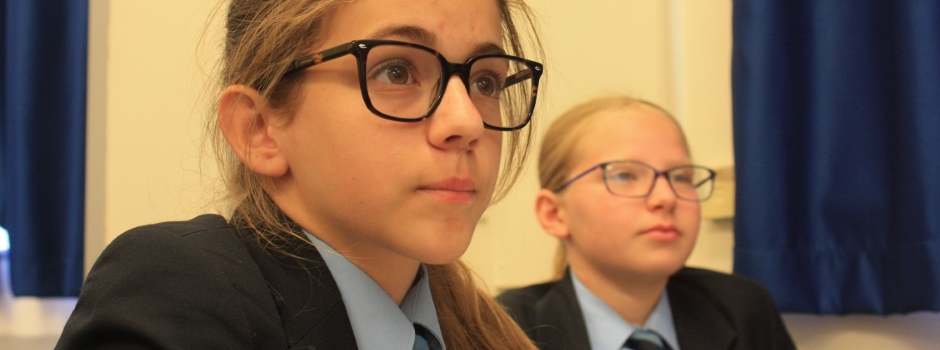
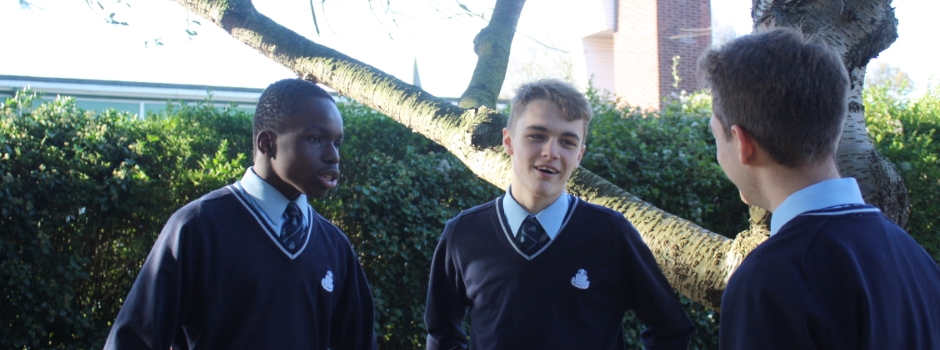


















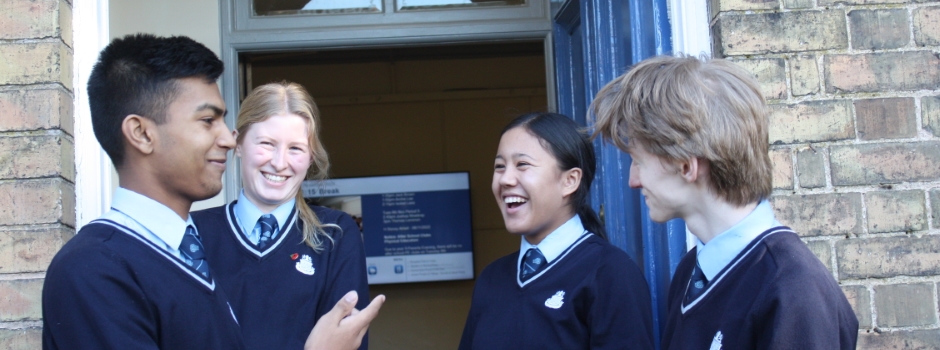

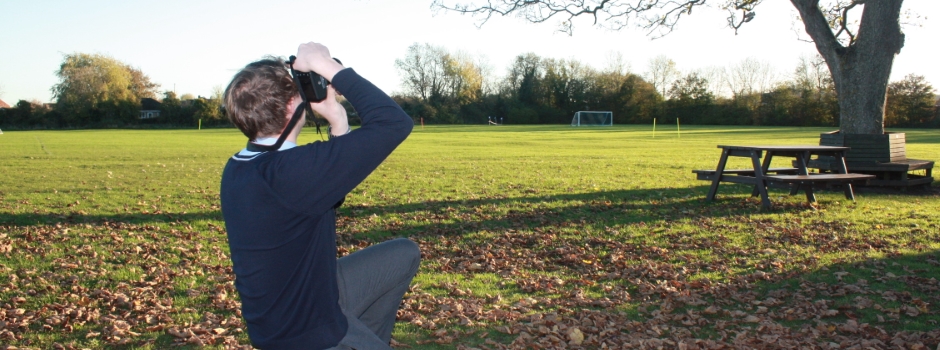


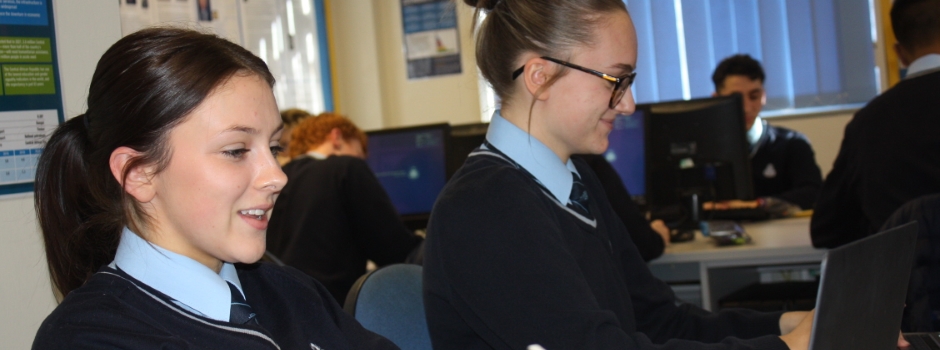



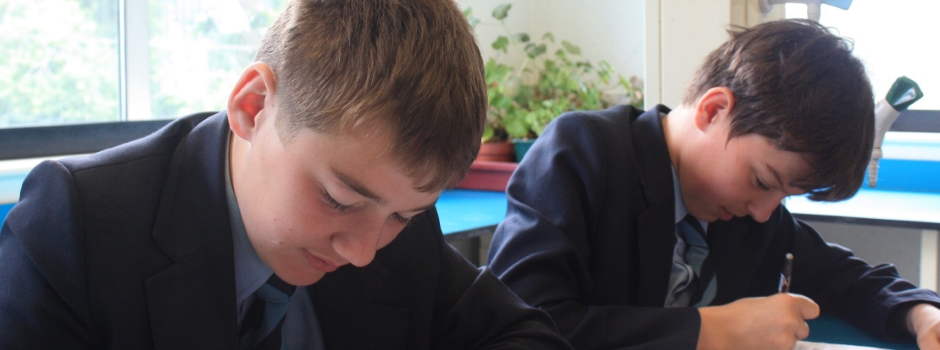
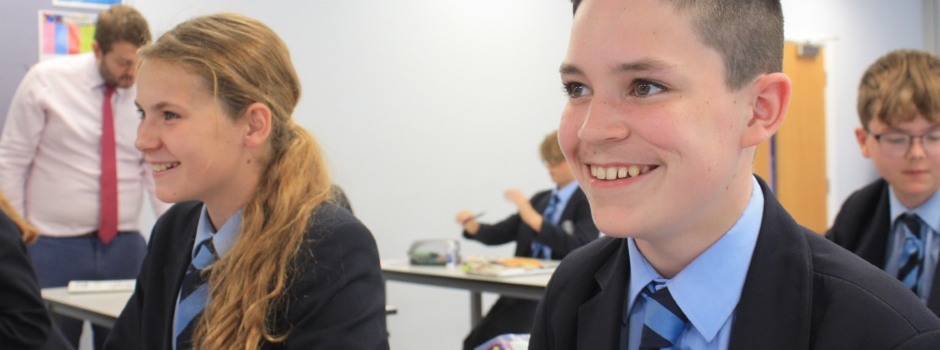
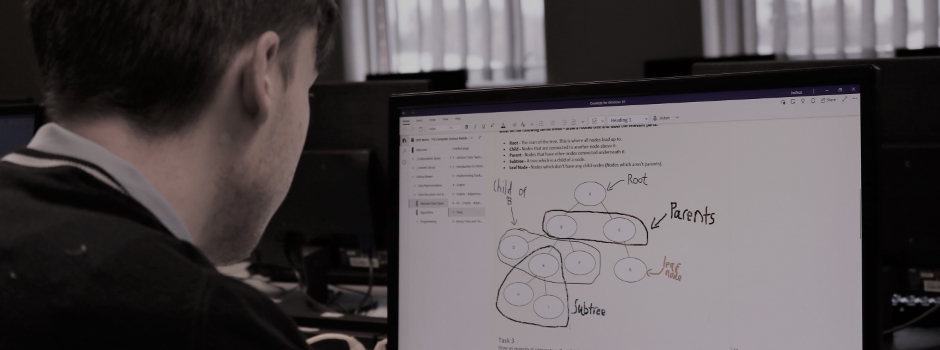


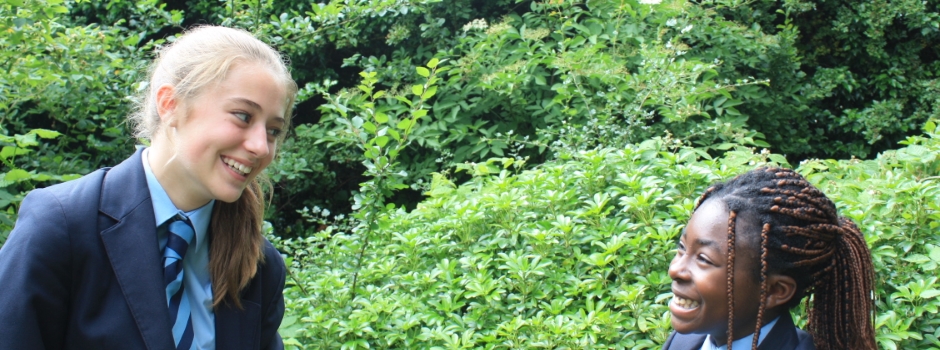









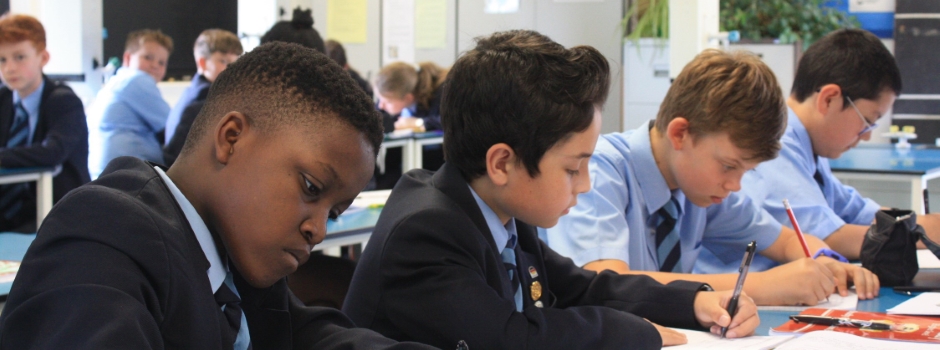





"...thank you for all of the support that you have given me over the last seven years because my school experience has honestly been a dream."
Year 10 - Curriculum on a Page
Showing the curriculum by year
Year 10
Curriculum Details - 2024/2025 (Current)
| Subject | Term 1 | Term 2 | Term 3 | Term 4 | Term 5 | Term 6 |
| Art | Culture project. Development of ideas in an A4 sketchbook linked to the theme of world culture. Drawings done from direct observation and secondary source images. Creative map art, collage, mixed media work, printing. Choice of three outcomes - mixed media piece, stamp design, vinyl record design. | Culture project. Continuation of culture project. Learning about different media, introducing collage and layering. Colour schemes, composition and analysis. Starting to plan final piece. | Culture project. Working on final piece 'AO4 Present'. Review and reflect on work. | Figure in a landscape project. Learning how to draw a figure - proportion, clothing, tone, structure. Working from life and producing a range of drawings and studies from primary and secondary source material. Learning about different types of landscape and how a figure fits into the landscape. | Figure in a landscape lino print. Developing ideas from landscape imagery. Composition, colour schemes, planning ideas for a lino print. Cutting skills, printing and registering. Mounting prints. | Presentation of Figure in Landscape work. Year 10 Summer exam. Introduction to new project - Natural forms. Making your own mini sketchbooks. Collecting source material, mini workshops experimenting with clay techniques. |
| Biology | Photosynthesis: Reaction, rates, factors effecting photosynthesis. Uses of glucose. Required practical 6. | Respiration and homeostasis: Aerobic and anaerobic respiration, metabolic processes and the response to exercise. Introduction to homeostasis. | The human nervous system: Structure and function. Brain and eye (Biology only), control of body temperature (biology only). Required practical 7. | Hormonal coordination in humans: Control of blood glucose levels, maintaining water and nitrogen balance (Biology only), kidney dialysis and transplant (Biology only). Human reproductive hormones and the menstrual cycle. Contraception, hormones to treat infertility and negative feedback. | Plant hormones: Control and coordination on plants, uses of plant hormones. Required practical 8 (Biology only). | Reproduction, variation and evolution: Sexual and asexual reproduction, meiosis, genomes, DNA structure (Biology only), genetic inheritance, genetic diseases and Mendel. |
| Business Studies | Business in the Real World - basic functions and types of business, business sectors, business enterprise and entrepreneurship, business ownership, aims and objectives, stakeholders, expanding a business, unit cost calculations and the economic climate. | Business Operations - production processes including job and flow production methods, efficiency in production, legislation, procurement, factors effecting choice of supplier, procurement and logistics and supply chain management. | Business Operations - the concept of quality, ethical and environmental considerations focused around the operations of a business, what makes good customer service and the methods used to provide this and how ICT advances have allowed for customer service to develop. | Human resources - Organisational structures including flat and tall structures, recruitment including internal and external methods and the recruitment and selection process and documentation and legislation. | Human Resources - motivation including financial and non-financial methods, training including induction, on the job and off the job and ethical consideration linked to operations carried out by the Human Resource Department. | Mock exams. Students catch up, recap & revise. Research project set which covers components on exam paper 1. |
| Chemistry | The Rate of Chemical Change: Factors which affect the rates of chemical reactions, calculation of rates of reaction, collision theory, activation energy and the use of catalysts. | Energy Change 1: Exothermic and endothermic reactions, measuring energy changes, reaction profiles and bond energy calculations. | Quantitative Chemistry 1: Conservation of mass, balanced chemical equations, relative formula mass, moles and calculations involving amounts of substances in equations (including identifying limiting reagents). Percentage yield and atom economy. | Organic Chemistry 1: Crude oil, hydrocarbons, alkanes, fractional distillation, properties of hydrocarbons. | Organic Chemistry 1 (Cont...): Cracking, alkenes and addition polymerisation | Quantitative Chemistry 2: Concentrations of solutions, using moles and concentrations in calculations including titrations, amount of substance calculations in relation to volumes of gases. |
| Computer Science | Data representation 2 - Logical and arithmetic binary shifts, storing sound, data compression. | Programming 3 - String functions, lists and while loops | Programming 3 continued - as well as looking at trace tables - evaluating the values of a programme by stepping through it line by line. | Networks 1 - A look at different types of networks and different topologies along with speeds and transmission media | Programming 4 - Files (reading, writing) and Formatting | Networks 2 - TCP/IP model, Protocols and a closer look at wireless technologies. |
| Design Technology | Year 10 we focus on section B of the exam paper Resistant materials group focuses on Timber Graphic Design Group focuses on Paper and Board 3.2.1 Selection of materials or components 3.2.2 Forces and stresses | 3.2.3.1 Social and ecological issues 3.2.3.2 The six R’s 3.2.4 Sources and origins 3.2.5.1 Properties of materials NEA | 3.2.5.3 Shaping and forming 3.2.6 Stock forms of materials 3.2.7 Scales of production NEA | 3.2.8.1 Tools, equipment and processes 3.2.8.2 Cutting to tolerance 3.2.8.3 Commercial processes 3.2.8.4 Quality control 3.2.9 Surface finishes and treatments Nea – Section A and C | 1st June official NEA Section A Analysing the three challenges Mind Map and Mood board Client Identified and interview 3.3.3.1 Past and present designers 3.3.3.2 Design companies Questionnaire 3.3.1.1 Investigation; primary and secondary | NEA Section A continued Designers Relevant Research Evaluation of Research Review against mark scheme Section B Design Brief Justified Specification Review against mark scheme 3.3.1.2 Writing a design brief and specification |
| DT: Resistant Materials | Year 10 we focus on section B of the exam paper Resistant materials group focuses on Timber Graphic Design Group focuses on Paper and Board 3.2.1 Selection of materials or components - Timber and wood 3.2.2 Forces and stresses - Timber and wood | 3.2.3.1 Social and ecological issues 3.2.3.2 The six R’s 3.2.4 Sources and origins 3.2.5.1 Properties of materials NEA | 3.2.5.3 Shaping and forming 3.2.6 Stock forms of materials 3.2.7 Scales of production NEA | 3.2.8.1 Tools, equipment and processes 3.2.8.2 Cutting to tolerance 3.2.8.3 Commercial processes 3.2.8.4 Quality control 3.2.9 Surface finishes and treatments Nea – Section A and C | 1st June official NEA Section A Analysing the three challenges Mind Map and Mood board Client Identified and interview 3.3.3.1 Past and present designers 3.3.3.2 Design companies Questionnaire 3.3.1.1 Investigation; primary and secondary | NEA Section A continued Designers Relevant Research Evaluation of Research Review against mark scheme Section B Design Brief Justified Specification Review against mark scheme 3.3.1.2 Writing a design brief and specification |
| English | Narrative & Genre - Language Paper 1 Worlds & Lives: contemporary voices in poetry - an introduction to poetry at GCSE (unseen and AQA Poetry Anthology cluster | Narrative & Genre - Language Paper 1 AQA Poetry Anthology Cluster | The power of language - Language Paper 2 (including rhetoric and argument) Literary Heritage: The Gothic - The Strange Case of Dr Jekyll & Mr Hyde | The power of language - Language Paper 2 (including rhetoric and argument) Literary Heritage: The Gothic - The Strange Case of Dr Jekyll & Mr Hyde | The power of language - Language Paper 2 Narrative & Genre: The modern novel or drama (Animal Farm or An Inspector Calls) | The modern novel or drama (Animal Farm or An Inspector Calls) Spoken Language Endorsement Careers: Political campaigning, journalism, broadcasting |
| French | Global issues: environmental problems and their solutions, discussing inequality and poverty in the world Grammar: si clauses, recognising the pluperfect tense, verbs of possibility. | Travel and tourism: holiday preferences, visiting different places in French speaking countries Grammar: depuis + present tense, après avoir/être + past participle, venir de + infinitive, using three tenses together | My studies: describing subjects/school facilities, comparing school in UK and France, describing school life in different countries, describing your ideal school Grammar: adverbs, perfect tense revision, conditional tense revision | Film Study: Les Choristes. The film explores the importance of a positive attitude towards children, the need for a positive teacher/student relationship, and the way in which teachers and students can grow and learn from each other. Students analyse key scenes from the film and produce a review. | Careers: talking about future options, university, gap year, apprenticeship, work experience, discussing how to get a job and advantages and disadvantages of getting a job Grammar: revision of the future tense, passive voice, si clauses | Speaking exam preparation: role plays, photo cards, general conversationreading aloud questions all of which cover the themes taught this year. Translation skills Grammar: using multiple tenses together |
| Geography | The changing economic world: Economic futures in the UK , causes of economic change, a post-industrial economy, science and business parks, environmental impacts of industry, social and economic changes in the rural landscape. Careers: Town Planner (Unifrog) | The changing economic world: Transport infrastructure (airports), the north-south divide, Lancashire LEP, UK in the wider world. Coastal Landscapes - Wave type and characteristics. Coastal Processes (weathering, mass movement, erosion, transportation and deposition) | Coastal Landscapes: Wave type and characteristics, coastal Processes, coastal landforms, formation of erosion landforms, characteristics and formation of depositional landforms, management strategies (Skegness) and hard and soft engineering strategies. | Urban issues and challenges: Urbanisation, megacities, Rio de Janeiro: importance, growth, challenges (social, economic and environmental), squatter settlements, management of favelas and Favela Bairro project. | Urban issues and challenges: Bristol: importance, opportunities and challenges (social, economic, environmental), Temple Quarter regeneration project. | Urban issues and challenges: Sustainable urban living, Friberg. Fieldwork: Coastal fieldtrip (Skegness), and write up. |
| German | Global issues: local/global environmental problems and their solutions, discussing inequality and poverty in the world Grammar: imperative, using the pluperfect tense, recognising/using reflexive pronouns, using reflexive verb with direct objects | Travel and tourism: accommodation, holiday preferences, visiting different places in German speaking countries Grammar: recognising imperfect tense of irregular verbs, using coordinating and subordinating conjunctions, dual case prepositions, relative pronouns | My studies: describing subjects/school facilities; understanding the different school system (comparison UK and Germany) Grammar: prepositions seit/vor, infinitive constructions | My studies: describing school day, different aspects of school life, your ideal school Grammar: using common subjunctive forms, revising reflexive verbs | Speaking exam preparation Careers: talking about future options, university, gap year, apprenticeship, work experience, discussing how to get a job and advantages and disadvantages of getting a job Grammar: using "which" as well as verbs followed by "zu". | Speaking exam prep Careers: Choosing a career and different career choices (including ideal job) Focus on careers with MFL or the skills developed in MFL. Grammar: subordinating conjunctions, the genitive. Translation skills and using multiple tenses together. |
| History | Anglo-Saxon & Norman England, 1060-1089; focus on continued opposition to William (the Harrying of the North and 1075 Revolt). Then study the Norman process of occupation, emphasizing creation of the Feudal System, church reforms and centralisation of power. | Anglo-Saxon & Norman England, 1060 - 1089; continue on the occupation with focus on the Domesday Book, demesne and sheriffs. Then follow-on with the end of William's reign; looking at his inheritance, the relationship with his son, Robert and the rebellion of 1088. | Weimar and Nazi Germany, 1918 - 1939; focus on the legacy of World War I, the political revolts and the impact of hyperinflation. Then study Stresemann's solution to these crises and how life changed in the Weimar period (especially for women). | Weimar and Nazi Germany, 1918 - 1939; the early years of Hitler's career (1918 - 1920), and the development of the Nazi Party (1920-23) and the failure of the Munich Putsch. Then study the lean years (1924-29) and how Nazis worked towards an electoral victory. | Weimar and Nazi Germany, 1918 - 1939; the growth of the Nazi Party (1929-32) and how Hitler became Chancellor (Jan. 1933) and consolidated his hold on Power (1933-34). Focus on the development of the Police State and the effectiveness of Nazi propaganda. | Weimar and Nazi Germany, 1918 - 1939; how the Nazis silenced opposition in Germany amongst the young and within the church. Study Nazi policies (youth, women and the workers) and assess how better off Germans were. Look at minority persecution. |
| Mathematics | Unit 9: Equations & inequalities - Solving quadratic and simultaneous equations, Inequalities Unit 10: Probability - Combined events, Mutually exclusive events, Experimental probabilities, Independent events and tree diagrams, Conditional probability, Venn diagrams and set notation TERM ASESSMENT | Unit11: Mulitiplicative reasoning - Growth and decay, Compound measures, Ratio and proportion TERM ASSESSMENT | Unit 13: Further trigonometry - Trigonometric graphs, Calculating areas, sine rule, cosine rule, 2D&3D trig problems Unit 12: Similarity & Congruence in 2D&3D - Congruence, Geometric proof and congruence, Similarity, Similarity in 3D solids TERM ASSESSMENT | Unit 14: Further statistics - Collecting data, Cumulative frequency, box plots and histograms TERM ASSESSMENT | Unit 15: Equations & Graphs - Quadratics, expanding more than two brackets, sketching graphs, graphs of circles, cubes and quadratics Unit 16: Circle Theorems & Circle geometry TERM ASSESSMENT | Unit 17: Algebra - Changing the formulae subject (more complex), solving equations, algebraic fractions, rationalising surds, proof SUMMER EXAMS |
| Physical Education | 3 practical areas [dependent on year 9 practical scores - areas covered across term 1 and 2] TOPIC 3: Fitness. Students to develop an understanding of the components of fitness required in sport and fitness testing. Analysis and Evaluation coursework started. | 3 practical areas [dependent on year 9 practical scores - areas covered across term 1 and 2] TOPIC 3: Fitness. Students to develop an understanding of the components of fitness required in sport and fitness testing. TOPIC 3 test on fitness | 3 practical areas [dependent on year 9 practical scores - areas covered across term 3 and 4]. TOPIC 4: Training. Students to develop understanding of the principles of training, methods of training and training zones, along with the application and suitability to sports performers | 3 practical areas [dependent on year 9 practical scores - areas covered across term 3 and 4]. TOPIC 4: Training. Students to develop understanding of the principles of training, methods of training and training zones, along with the application and suitability to performers TOPIC 4 test on training | Athletics in practical TOPIC 5: SPORTS PSYHOLOGY. Students develop understanding on how skills are learned, information is processed and the psychological factors that impact performance. | Athletics in practical TOPIC 5: SPORTS PSYHOLOGY. Students develop understanding on how skills are learned, information is processed and the psychological factors that impact performance. TOPIC 5 test on sports psychology Analysis and Evaluation coursework completed |
| Physical Education (non exam) | Health and Fitness, Yoga, Team Games. Demonstrate elements of personal health and fitness, be able to plan personal programmes of exercise, to suggest improvements and implement principles of healthy lifestyle, improving techniques as well as refining strategic play to outwit opponents. | Team Games, Athletics and Walking. Be able to officiate games accurately , lead coaching sessions and develop analysis skills, suggest improvements and implement practices based upon those suggestions. | Badminton, Health and Fitness and Football. Pupils should be able to score and officiate badminton games accurately. Pupils should lead coaching sessions and develop their analysis skills. Pupils should be able to suggest improvements and implement practices based upon those suggestions. | Badminton, Dance and Health and Fitness. Be able to demonstrate the essential elements of group work, be able to compose sequences of movement accurately with control and develop their analysis skills. | Athletics. Developing and improving techniques, refining strategies to build resilience and achieve personal best performance, be able to demonstrate the essential elements of running, throwing and jumping, be able to time/measure accurately and officiate athletic competition. | Team Building. Develop co-operation, collaboration, resilience and flexible thinking through a range of challenging tasks and group problems. |
| Physics | Waves in air, fluids and solids, transverse and longitudinal waves, properties of waves, required practical 8, reflection of waves (physics only), required practical 9 (physics only), sound waves (physics only), waves for detection and exploration (physics only) | Types of electromagnetic waves, properties of electromagnetic waves 1, required practical 10, properties of electromagnetic waves 2, uses and applications of electromagnetic waves, lenses (physics only), visible light (physics only), black body radiation (physics only) | Forces and their interactions, scalar and vector quantities, contact and non-contact forces, gravity, resultant forces, resolving forces, vector diagrams, free body diagrams | Work done and energy transfer, forces and elasticity, required practical 6, moments (physics only), levers and gears (physics only), distance and displacement, speed, velocity, acceleration | Newton's first law, Newton's second law, required practical 7, Newton's third law, stopping distance, thinking distance, braking distance, momentum, pressure in fluids (physics only) | Waves & Forces Review |
| PSHE | Health and well-being. Mental health - Mental health and ill health, stigma, safeguarding health, including during periods of transition or change. | Living in the wider world. Financial decision making - The impact of financial decisions, debt, gambling and the impact of advertising on financial choices. (careers) | Relationships. Healthy relationships - Relationships and sex expectations, myths, pleasure and challenges, including the impact of the media and pornography. | Health and well-being. Exploring influence - The influence and impact of drugs, gangs, role models and the media. | Relationships. Addressing extremism and radicalisation - Community cohesion and challenging extremism. | Living in the wider world. (careers) Work experience - Preparation for and evaluation of work experience and readiness for work. |
| Religious Studies | Relationships and Families: Men and women Christian understandings of equality | The Existence of God: The Question of God The nature of reality Experiencing God | Religion, peace and conflict: Violence and conflict Peace and peace making Forgiveness and reconciliation | Dialogue between religious and non-religious beliefs and attitudes: Challenges for religion Dialogue within and between religious groups Dialogue between religious and non-religious groups | Revision and GCSE Examination | Careers |
| Spanish | Travel and tourism: holiday preferences, visiting different places in Spanish-speaking countries Grammar: use of preterite and imperfect tenses, expressions of sequence, estar + past participle, passive and passive forms with se, desde hacía + imperfect | Global issues: environmental problems and their solutions, discussing inequality and poverty in the world Grammar: using ‘if’ sentences with present, reflexive constructions, negative expressions | Grammar and exam skills review and development: introduction of present subjunctive in a variety of contexts with form and structure highlighted | My studies: describing subjects/school facilities, comparing schools in UK and Spain, describing school life in different countries, describing your ideal school Grammar: imperative, perfect tense, desde hace + the present, SE DEBE, HAY QUE, verbs that take infinitive, DEBERIA SER / DEBERIA HABER | Preparation for the speaking exam - general conversation Careers: talking about future options, university, gap year, apprenticeships, work experience. | Preparation for the speaking exam - Role Play, Reading Aloud Task and Photocard Careers: discussing how to get a job and advantages and disadvantages of getting a job Career focus on MFl and MFL skills. Grammar: LO QUE / LO + adjective, present subjunctive, reflexive verbs |